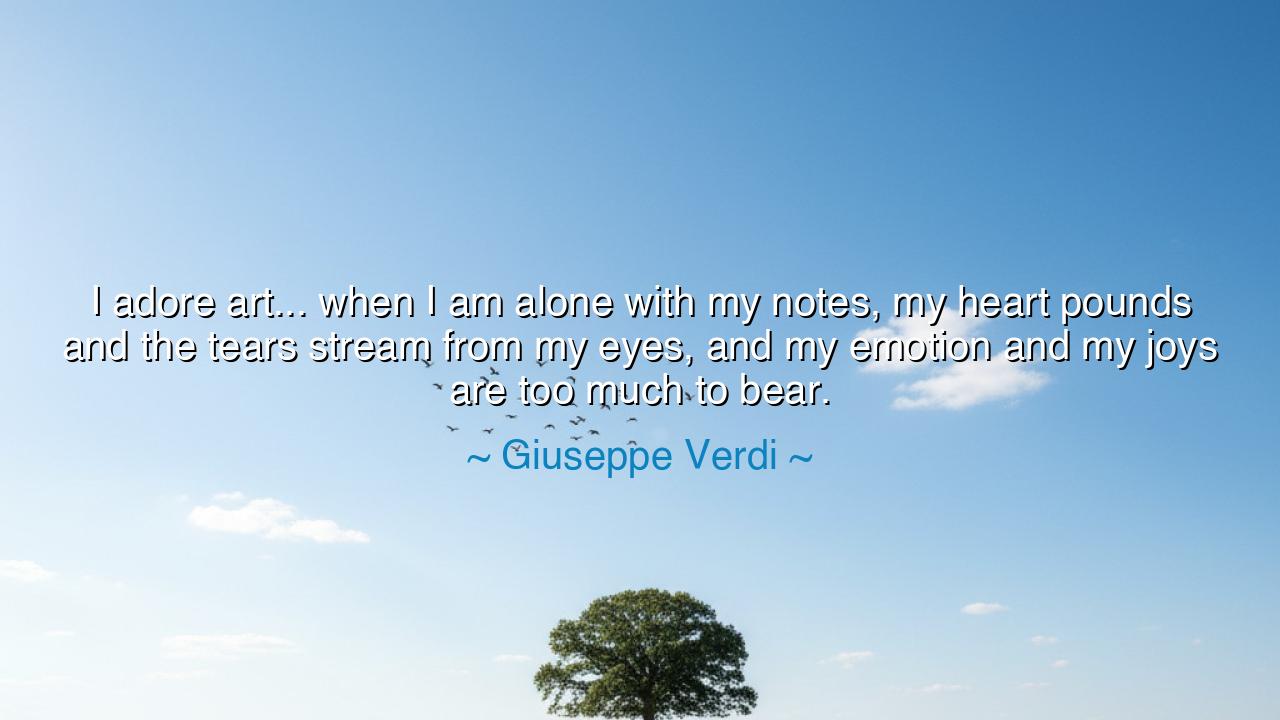
I adore art... when I am alone with my notes, my heart pounds and
I adore art... when I am alone with my notes, my heart pounds and the tears stream from my eyes, and my emotion and my joys are too much to bear.






“I adore art... when I am alone with my notes, my heart pounds and the tears stream from my eyes, and my emotion and my joys are too much to bear.” — Giuseppe Verdi
In these trembling, exalted words, Giuseppe Verdi, the great Italian composer and master of opera, opens the door to the sacred chamber of the artist’s soul. His confession is not one of pride but of surrender — surrender to the power of art, to the beauty that overflows from creation itself. “When I am alone with my notes,” he says, “my heart pounds... and tears stream from my eyes.” Here, Verdi speaks of that divine madness known only to those who have felt inspiration seize them — when art ceases to be something one makes, and becomes something one receives. It is as though the soul becomes a vessel for the infinite, and in that moment, joy and suffering mingle until they are one and the same.
The origin of this quote rests in the fervent life of Verdi himself — a man whose music rose not from comfort, but from tragedy and passion. Born in 1813 in humble circumstances, he climbed from obscurity to become one of the most celebrated composers in history. Yet his journey was carved by sorrow: the death of his wife and children, the scorn of early critics, the loneliness of genius. It was in solitude — “alone with his notes” — that he found both torment and transcendence. When he wrote, he communed with forces larger than himself — the same forces that guided Beethoven, Michelangelo, and the poets of old. To Verdi, art was worship, and the composer’s desk was his altar.
The power of his emotion reveals the truth that creation is not an act of ease, but of ecstasy — a state where the soul trembles between agony and rapture. When Verdi wept over his notes, he was not weak; he was witnessing the birth of something eternal. Every great artist, every true creator, has known this sacred fire — that moment when beauty strikes so deep that it wounds the heart with joy. Leonardo da Vinci, painting the sorrowful eyes of his Madonnas, spoke of art as the “shadow of divine perfection.” Beethoven, in his deafness, wrote symphonies he could not hear, yet said that he felt the music of heaven within him. Like them, Verdi’s tears were not of sadness, but of awe — for to touch beauty is to brush against the eternal.
There is, in Verdi’s confession, a solitude both profound and holy. He says, “When I am alone with my notes.” In that aloneness lies the essence of art — the stillness where the noise of the world falls away, and one listens to the whisper of the divine. The ancients would call this inspiration, from the Latin inspirare — “to breathe into.” They believed that the gods breathed creation into the hearts of men. Verdi’s heart, pounding with emotion, was not merely his own — it was the pulse of something immortal, something larger than human life.
Yet his words are not only for artists but for all who seek meaning. He teaches that true passion is not comfortable; it shakes the soul, it overwhelms the senses, it demands tears as well as triumph. To love one’s craft — to adore it, as Verdi did — is to open oneself to both wonder and pain. For in giving oneself fully to beauty, one becomes vulnerable, naked before the mystery of creation. But it is through that vulnerability that greatness is born. Verdi’s music endures not because it was written skillfully, but because it was written sincerely — with blood, with weeping, with a heart that dared to feel too much.
Consider the tale of Van Gogh, who, in his lonely studio beneath the stars, painted with such intensity that every brushstroke seemed to burn. He too wept before his work, not from despair, but from the unbearable beauty of what he saw — the colors of the world blazing within him. Like Verdi, he was “alone with his notes,” though his notes were colors, his symphonies painted on canvas. Such souls remind us that the world is moved not by cold intellect, but by hearts that dare to break open for beauty’s sake.
So, O seeker of truth and creation, take this lesson to heart: to adore what you do is to live fully. When you sit alone with your work — whether it be music, craft, or thought — do not fear the trembling of your heart or the tears that fall. They are the signs that something divine is stirring within you. Do not seek to restrain emotion, for it is the lifeblood of creation. As Verdi teaches, the highest joy is not comfort but rapture — the rapture of being so consumed by beauty that the self dissolves into it. Love your art, your calling, your purpose, until it makes you weep — for in that moment, you will have touched eternity, and eternity will remember your name.






AAdministratorAdministrator
Welcome, honored guests. Please leave a comment, we will respond soon